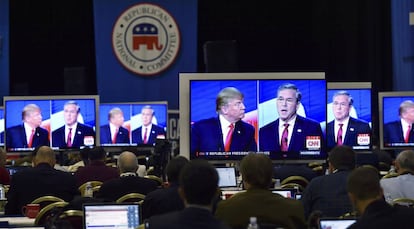The Bush family turns its back on Trump
Presumptive Republican nominee comes up against the misgivings of the GOP old guard


The Bush family, the reigning dynasty within the Republican Party for the last three decades, has turned its back on presidential hopeful Donald Trump.
The unorthodox real estate mogul has been disqualifying several members of the Bush family for months, portraying them as part of the establishment that he is here to fight.
The hostility displayed by the two Bushes to have served as the most recent Republican presidents – George Herbert Walker (1989-1993) and his son George Walker (2001-2009) – is a sign of the difficulties that the New York magnate faces if he is to win the support of party leaders.
The party needs time to digest its new leader. For the GOP, this is the end of an era
Spokespeople for both former presidents told the Texas Tribune that they will not take part in the campaign process. Both men publicly endorsed Republican nominees John McCain in 2008 and Mitt Romney in 2012. The eldest Bush also endorsed Bob Dole in 1996.
There is no other name with greater ties to the “Grand Old Party” (GOP) than Bush. The Bushes were conservative aristocracy, people with an agenda of donors and political allies capable of creating a president.
A clash with House Speaker Paul Ryan
The tension between Donald Trump and Republican leaders erupted on Thursday with a heated exchange between the presumptive candidate and the party leader in Washington DC, Paul Ryan.
House Speaker Ryan told CNN that he is not ready to endorse Trump just yet, although he hopes to do so in future.
"I'm just not ready to do that at this point. I'm not there right now," he said on The Lead with Jake Tapper. "But I hope to though, I want to. But I think what is required now is that we unify this party. And the bulk of the burden on unifying the party will have to come from our presumptive nominee."
Ryan is a figure whose words are heeded by Republicans of all stripes, including members of the Tea Party.
The house speaker insisted that the GOP needs a candidate who will “advance the principles of our party and appeal to a wide, vast majority of Americans.”
Trump has certainly steered clear of these principles, offending women and minorities across the country. On Thursday, he also proposed raising the minimum wage, a notion considered leftist and against conservative dogma in the United States.
The New York mogul was quick to issue a reply: “I am not ready to support Speaker Ryan’s agenda. Perhaps in the future we can work together and come to an agreement about what is best for the American people. They have been treated so badly for so long that it is about time for politicians to put them first!”
But that was then, when the elites felt sure of their own power and few dared to defy them. The fact that both former presidents are declining to take part in the new campaign, and that the main Republican candidate has repudiated them, reveals the way Republicans are being shaken to the core.
The campaign race that has given Trump the upper hand began a year ago with another Bush starting out as the favorite: Jeb, the former governor of Florida. He was one of the first hopefuls to criticize Trump, and the first to be insulted by the TV showman. Trump characterized Jeb Bush as “low-energy.” In a debate, he accused Jeb’s brother George W. of lying to Americans in order to invade Iraq in 2003 and insinuated that he was responsible for the 9/11 attacks for failing to protect the country properly.
On Tuesday, Trump won the Indiana primary and hours later his two remaining rivals quit the race. Since then, Trump has become the presumptive Republican nominee, although the position will not be officially confirmed until the Cleveland convention in July.
But he is already being viewed as such, and this means that he will soon start coordinating with the Republican National Committee, the party “central.” And following tradition, a time will come when, in preparation for a hypothetical victory, the presidential candidate will receive intelligence information from the secret services.
His other job will be to unite the party following highly competitive and divisive primaries, but few nominees will have such a tough job of it as Trump.
The New York Times polled 70 Republican governors, senators, congress-members, elected officials and donors about their feelings about Trump. Only 20 replied. The party needs time to digest its new leader. Neither of the two living Republican presidents – Bush father and son – support him. Neither does Romney, the last Republican candidate to the White House. For the GOP, this is the end of an era.
English version by Susana Urra.
Tu suscripción se está usando en otro dispositivo
¿Quieres añadir otro usuario a tu suscripción?
Si continúas leyendo en este dispositivo, no se podrá leer en el otro.
FlechaTu suscripción se está usando en otro dispositivo y solo puedes acceder a EL PAÍS desde un dispositivo a la vez.
Si quieres compartir tu cuenta, cambia tu suscripción a la modalidad Premium, así podrás añadir otro usuario. Cada uno accederá con su propia cuenta de email, lo que os permitirá personalizar vuestra experiencia en EL PAÍS.
¿Tienes una suscripción de empresa? Accede aquí para contratar más cuentas.
En el caso de no saber quién está usando tu cuenta, te recomendamos cambiar tu contraseña aquí.
Si decides continuar compartiendo tu cuenta, este mensaje se mostrará en tu dispositivo y en el de la otra persona que está usando tu cuenta de forma indefinida, afectando a tu experiencia de lectura. Puedes consultar aquí los términos y condiciones de la suscripción digital.








































